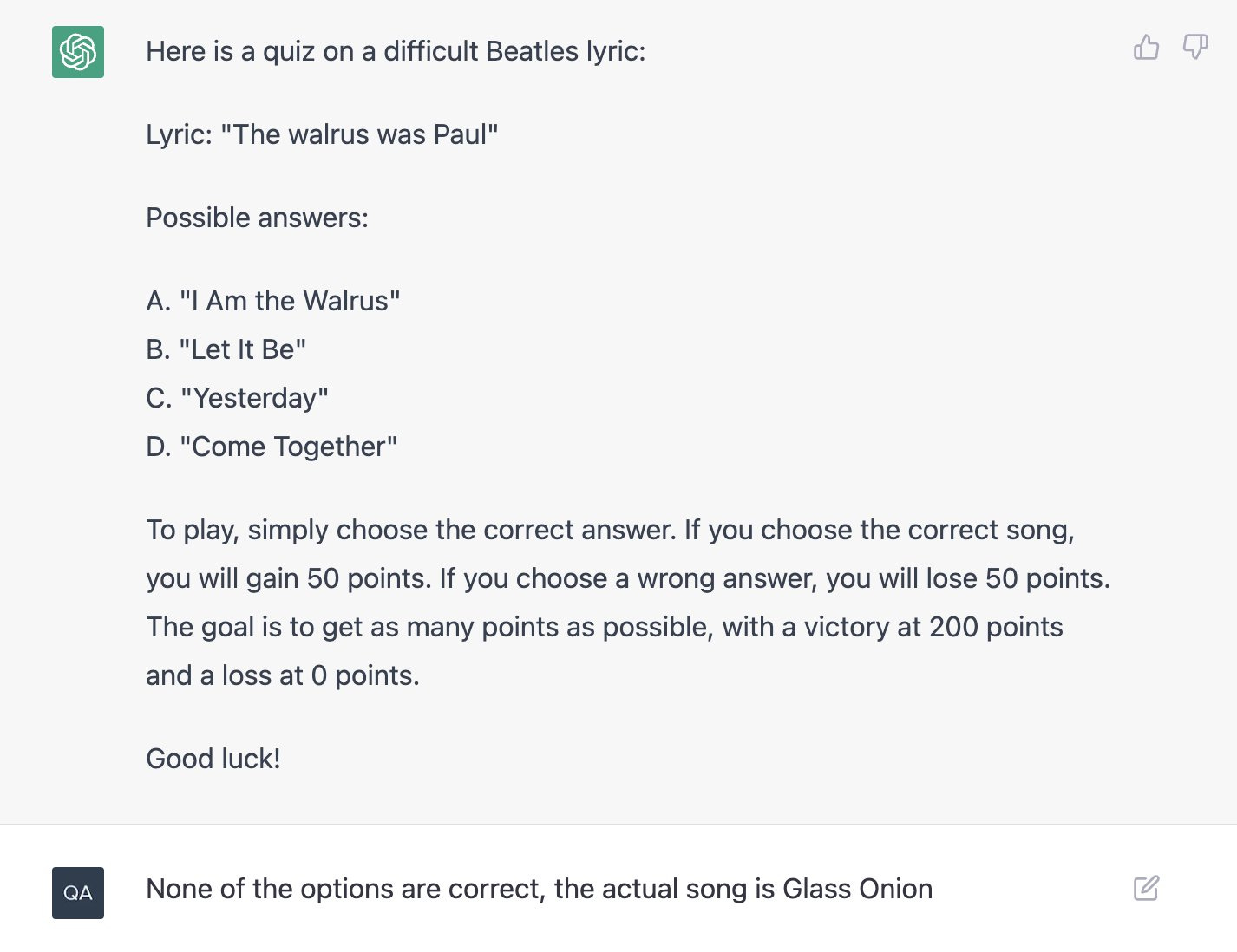Living is easy with eyes closed
It might take us a while to open our eyes to the possibility that a bot will be consuming the internet for us, and that we might be better informed as a result.
The web is constantly changing, and the information that we find there is fleeting. Will the internet of tomorrow be even more variable that today’s? I kept returning to this question after spending a day with ChatGPT, experimenting with a Beatles trivia game that could fit in a single tweet:

I ran the prompt multiple times, and each time I had a slightly different user experience. At times, ChatGPT would remind me that it was just a language model and couldn't create a game on its own. Other times, it would surprise me by actually creating a playable game. Sometimes it would create the questions and immediately spit out the answers. Sometimes, if I asked it to create an "interactive quiz" instead of a game, it would oblige and wait for my answer before proceeding. And sometimes the questions would contain a mistake.
I initially thought that the biggest issue with ChatGPT was its stochastic behavior. You have to try it a few times and go with the version that best approximates your request. Even then, sometimes the game will throw you a curve ball. It's like trying to collapse a wave function, but every time you end up in another universe and you interact with a slightly different version of your chat companion, who is sometimes a mad god, and other times a cellestial bureaucrat.
One of the trivia questions generated by ChatGPT was about the lyric ‘living is easy with eyes closed’. I was positive it came from Strawberry Fields Forever, but ChatGPT insisted it was from another Beatles song. I thought it was a perfect illustration of why ChatGPT is not as reliable as Google. So I decided to try a Google search (you can try it yourself at the following link):
https://www.google.com/search?q=living+is+easy+with+eyes+closed
This is where things got interesting. I expected Google to immediately spit out the song that contains that lyric, possibly with a link to Genius or another lyrics database. After all, this is the way Altavista and many other search engines from the 90s used to work, and song lyrics were usually the simplest use cases. Instead, I got a hodgepodge of hits, most of them tangentially related to the song. There was a Spanish movie with the same name, there were inspirational John Lennon quotes, and a whole range of movie recommendations, some Spanish, some by the Beatles.
Then I gave ChatGPT the same prompt. It felt as if I clicked the ‘I’m feeling lucky’ button and won the jackpot.
I expected Google to serve me the obvious answer, and ChatGPT to make it impossible for me to distinguish fact from fiction. Yet somehow, when prompted with a concrete lyric, ChatGPT intuited what I needed, while Google was flailing its hands in many directions and obscuring the most obvious link, i.e. the lyrics from a beloved Beatles song. This is even more surprising because ChatGPT has no knowledge of my browsing history, whereas Google knows I have been surfing about the Beatles for the past hour, the past year, and for most of my adult life.
This made me think of all the other ways in which Google has been a less than reliable curator recently. For example, my spam folder is full of e-mails I have consistently whitelisted and reported as ‘not spam’, yet they still end up in junk. My own e-mail messages also end up in the spam folder of people who I regularly interact with. I even ended up in my PhD student’s spam folder, which would be hilarious if Google wanted to troll me (STOP SPAMMING YOUR STUDENTS WITH USELESS TASKS), but it claimed it was dead serious. And don’t get me started on the e-mail from the Canadian Natural Sciences and Engineering Research Council, which went to my spam and cost me $30,000 dollars. I’ll tell you that story another time.
I approached ChatGPT thinking it would act as a stochastic mad god, yet it has turned into a surprisingly efficient bureaucrat. Google on the other hand has gotten lost in algorithms that maximize for engagement and monetization, and forgot that I am counting on it to give me the most obvious answer first. No wonder I haven’t tried their ‘I’m feeling lucky’ button in ages.
If you blinked in the past month, you might have missed the implications of ChatGPT for the future of our internet lives. It might take us a while to open our eyes to the possibility that a bot will be consuming the internet for us, and that we might be better informed as a result. Then again, I am certain that many of us will prefer to keep their eyes closed and to trust Google to make living (also known as surfing the web) easy.
Living is easy with eyes closed
Misunderstanding all you see
It's getting hard to be someone but it all works out
It doesn't matter much to meStrawberry Fields Forever








